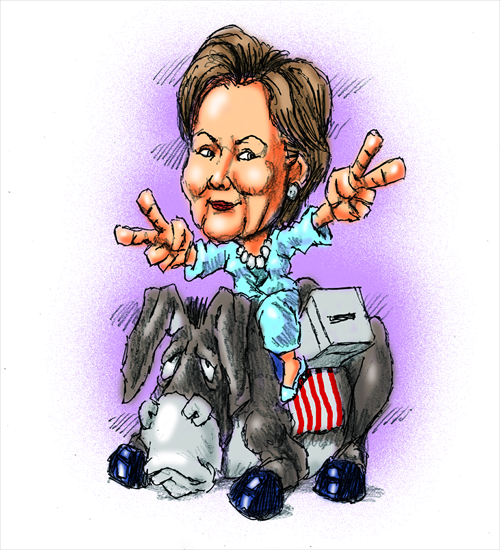Nothing inevitable about Clinton nomination

Illustration: Peter C. Espina/GT
Harsh attacks by Republican Party figures on Hillary Clinton's unannounced but increasingly obvious candidacy for the Democratic nomination for the presidential election of 2016 suggest that they are quite anxious about her appeal to many voters.
Presumably, she would do well with women, African-Americans, the educated, and trade unionists. However, doubts about her candidacy have been expressed by some very prominent Democrats, including Governor Deval Patrick of Massachusetts and the Majority Leader in the Senate Harry Reid.
They have made it clear that they do not oppose her, but they declare that the aura of inevitability generated by her supporters, by the absence as yet of any very plausible alternative candidates and by the certitudes and pseudo-certitudes of the very shallow news media might in the end have negative consequences on public opinion, even among those quite well disposed to the former secretary of state.
There are advantages, they argue, to a contest for the nomination, not least to the candidate herself. It was in some large measure, after all, overconfidence that caused her loss in 2008 to the relatively unknown and untried Barack Obama. At the moment, Vice President Joe Biden is alone in insisting that he too is very well qualified for the highest office.
Those are arguments on grounds of electoral strategy and tactics. There are, however, arguments made by others on grounds of principle. They consider that there should be a debate in the Democratic Party on its modern legacy of strong policies of state programs to regulate the economy, to institutionalize a decent minimum of economic and social equality, to make long-term investments in education, material and social infrastructure.
Senator Clinton is, along with her husband former president Bill Clinton, close to groups in the Democratic Party who have been ready to cut Social Security payments and subsidies for Medicare, Medicaid and social expenditure generally as part of a "Grand Bargain."
The "Grand Bargain" would reduce governmental deficits by curtailing exactly those welfare state benefits which have given the nation the modicum of social decency it has shown in the decades since Franklin Roosevelt's New Deal and Lyndon Johnson's Great Society project.
Two theories support the political preferences of the Clinton-led segment of the Democratic Party.
One is that deficits in the federal budget are intrinsically harmful, causing higher interest rates and generally limiting the expenditures of the private sector, the essential and primary source of prosperity. It follows that reductions in federal spending must have economically positive effects.
The theory is demonstrably false, as US prosperity has generally coincided with high levels of governmental expenditure.
The other theory is political, the banality that elections are won "in the middle."
It follows that sharply formulated electoral projects that seek to mobilize specific interest groups will alarm "moderate" voters supposedly interested in compromise and stability. That, too, is historically false as Clinton's own losing campaign against Obama in the primaries of 2008 showed.
Substantial numbers of Democrats, in public office, the unions, public interest groups and in independent journalism, are hesitant about Hillary Clinton, since there is little evidence that she has fundamental political positions that differ from a systematic retreat from the reformist legacy of the party.
The independent left-wing senator from Vermont, Bernard Sanders, is thinking of entering the Democratic primaries to make sure that this position is represented.
Large numbers of Democrats hope that Senator Elizabeth Warren of Massachusetts, a forceful antagonist of US banks and eloquent advocate for the economic and social rights of ordinary citizens, will seek the presidency.
In any event, their skepticism about Clinton is considerable, and she has done nothing to take steps toward them. Indeed, her husband has gone out of his way to criticize them.
The former secretary of state has a record in foreign policy of the selective retention of US hegemony, that is, the defense of as much of US power as can be retained in an increasingly resistant world. That much of her defense of acquired domination is accompanied by the constant evocation of human rights does not obscure her political alliance with the armed forces.
Obama has declared that the US must lead the world, even if it need not always do so with military force. That does not satisfy the Americans, across all ideological and party lines, who think of their nation's claims to leadership as an illusion which has led to disasters, material and moral, and which will be increasingly impossible to sustain in a very complex world.
A substantial number of Democrats share this view, and recall Clinton's support of the Iraq War and her failure to use her period as secretary of state to make a more decided break with the recent past.
Notions of the inevitability of Clinton's nomination may well be, in the circumstances, exaggerated.
The author is professor emeritus of Georgetown University Law Center. opinion@globaltimes.com.cn